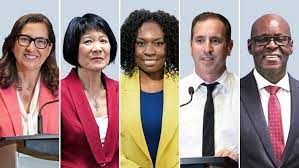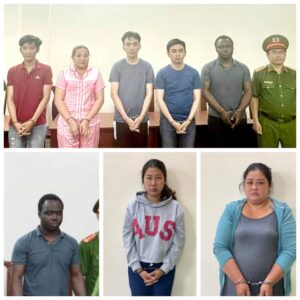
Toronto has a crowded field of candidates running to become our next mayor.
To help keep track of what they’re promising, CP24.com has compiled a promise tracker so that you can see what the candidates are pledging to do if elected and how their promises compare to one another.
Here are the key promises and policies from the leading candidates.
ANA BAILÃO
A key platform promise for Bailão has been to get the provincial government to take back responsibility for the Gardiner Expressway and Don Valley Parkway (DVP), a move that would save the city hundreds of millions of dollars over years. While the province has exhibited no willingness to resume responsibility for the highways, which were downloaded to the city by the Mike Harris government, Bailão says she would have a mandate the province couldn’t ignore if she’s elected.
Bailão has also promised to build the dedicated busway to replace the SRT through a deal with the federal and provincial governments and has said that she would charge riders just two dollars until the busway is complete. Similarly, she has said that she would charge riders of the Queen streetcar $2 until service is back to normal for them. Bailão has said she would also reverse service cuts, hire more TTC staff at stations, roll out cellular service, increase security camera schedules and increase cleaning schedules.
BRAD BRADFORD
Bradford has said he would install subway platform edge doors to make stations safer and make sure cellphone service is available underground to all riders. He has said he would accelerate work on the Gardiner East rebuild by allowing 24/7 construction in areas that aren’t near homes.
He would also divert the Queen streetcar to King Street between Spadina and Church instead of running streetcars along Richmond and Adelaide while the Ontario Line construction is underway. Bradford has also called for the province to fire Metrolinx CEO Phil Verster over the endless Eglinton Crosstown delays.
OLIVIA CHOW
Chow says she would build a dedicated busway in the path of the decommissioned Scarborough RT. She says she would pay for the estimated $60 million busway with money saved by building an at-grade boulevard to replace the Gardiner Expressway from Cherry Street to the DVP instead of rebuilding it. She says reversing the decision made by council seven years ago would save the city hundreds of millions of dollars.
She has said that fines for fare evasion should be cheaper.
Her other plans for the TTC include reversing recent service cuts, making the service faster and more reliable, putting more workers back in stations and making sure everyone on the system can use cellular service.
ANTHONY FUREY
Furey has said he’d authorize special constables to carry Tasers, upgrade police radios to work in all parts of the TTC, increase beat cop patrols on TTC property, and recruit more mental health workers to assist police on the transit system when needed. He’s said he would speed up the timeline for getting cellular service rolled out across the subway.
Furey has said he wants to see King Street opened to regular traffic while Queen Street is shut down for Ontario Line construction.
He has also said he plans to sue Metrolinx for $1 billion for breach of contract and damages over “their mismanagement of the Eglinton Crosstown LRT.”
MITZIE HUNTER
Hunter has laid out an ambitious, if pricey, transit plan. If elected, she says, she would extend the Sheppard subway line east to connect with the planned Scarborough subway extension of Line 2 and would also extend it west to connect to the western side of Line 1 at Sheppard West Station. She has pegged the cost at around $7 billion.
Hunter’s plans also include building the Waterfront East LRT and reversing recent service cuts and fare hikes. She said she would also make the TTC free for seniors and Wheel-Trans users.
JOSH MATLOW
Matlow has promised a $1.2 billion “Scarborough Moves” plan that would include a 23-stop Eglinton East LRT line from Kennedy Station to Malvern Town Centre; a nine-stop Sheppard East LRT from McCowan subway station to Neilson Road; and a busway in place of the Scarborough RT. He’s said he would pay for the plan with money saved by “rebuilding the eastern portion of the Gardiner on the ground,” as well as a previously announced parking lot levy.
Matlow has said he would reverse recent TTC service cuts, restore service to pre-pandemic levels by the end of his term, and reduce senior fares to $2.10 from $2.25. He’s also called for an independent inquiry into the Eglinton Crosstown delays.
MARK SAUNDERS
Saunders is promising to extend Line 4 (Sheppard) to McCowan Road and to speed up a study on extending the line west to connect with Sheppard West Station at Dufferin Street. He’s said he would also work to extend the Ontario Line north to Sheppard Avenue. Saunders has said he would work with other levels of government and infrastructure partners to make the subway expansion happen, but he has not said how he would pay for it.
Saunders has said he would make sure the city has at least 200 special constables fanned out across TTC stations, enhance their mental health training and provide them with body-worn cameras. He said that he would also prevent loitering on TTC property by enforcing existing bylaws, and would make streetcar and bus stops safer by creating a minimum lighting standard. He says that over the long term, he would integrate TTC special constables with the Toronto Police Service.
Saunders has said he would end the streetcar right-of-way on King Street by reopening the road to all traffic and would allow seniors to ride the TTC for free on Mondays.
ANA BAILÃO
Bailão says she would begin improving transit safety, meet with the prime minister and premier to get a “new deal” that would address Toronto’s fiscal challenges, and would make sure the city starts to build housing.
BRAD BRADFORD
Bradford says he would usher in an “era of accountability” by issuing mandate letters to department heads at the city, outlining his expectations.
OLIVIA CHOW
Chow says she would bring in a strong team to build affordable housing, build TTC services and work on getting a new deal with the province and feds.
ANTHONY FUREY
Furey says he’ll phase out harm reduction sites and replace them with treatment centres, hire more cops and “say no more bike lanes on major roads.”
MITZIE HUNTER
Hunter says she would begin building more housing, start fixing the TTC and would begin making sure the city is more livable.
JOSH MATLOW
Matlow says he will reverse the cuts to the TTC, begin initiatives to get affordable housing built, and focus on the budget.
MARK SAUNDERS
Saunders says he would focus on transit, affordability and affordable housing.

ANA BAILÃO
Bailao says she would make the ferry to the Toronto Islands free for riders under 12 years of age and negotiate with Metrolinx so that other riders can pay with Presto to take the ferry.
She says she will also speed up the expansion of Bike Share TO east and west on the waterfront trail, to the Toronto Islands, in the Etobicoke hydro corridor park and other areas.
She would also accelerate improvements to playgrounds, splash pads and sport fields.
BRAD BRADFORD
Bradford plans to build five new cricket pitches over five years in order to support the growing popularity of the sport.
Bradford says he would refund application and permit fees for all businesses participating in CafeTO this year and fix the program so that patios are ready to go by the first Thursday in May in future years.
OLIVIA CHOW
Chow says she will expand weekday library hours and ensure every Toronto Public Library branch is open seven days a week.
Chow also says she will help make the city’s buildings more climate-friendly through retrofits and other programs.
Chow says she would also improve the troubled CaféTO program so that more businesses are encouraged to apply.
ANTHONY FUREY
Furey says he will have the city allow regular street parties, outdoor performances, farmers’ markets and festivals on evenings and weekends on the closed portion of Queen Street during Ontario Line construction.
He also says he will eliminate fees associated with CaféTO and make permanent temporary zoning by-laws that allow for more creative patios to be constructed on private spaces like parking lots.
MITZIE HUNTER
Hunter has said she would open 16 additional youth hubs to offer drop-in spaces for teens after school and in the summer.
She says she would also use “existing municipal assets” to create a municipal broadband network.
Library service at all branches would also be extended from 11 a.m. to 5 p.m. on Sundays.
Hunter says she would rebate this year’s CafeTO fees and cancel fees for the program going forward.
JOSH MATLOW
Matlow says he would operate all 100 library branches on Sundays year-round, as opposed to the 58 which currently open on Sundays in the school year and the 19 which open Sundays in the summer.
His plan would also see schools operate as community centres on evenings and weekends, starting with 25 in underserviced neighbourhoods.
He’s also promised a number of new walking and recreation trails, including transforming the elevated portion of the rail line just north of Ellesmere Road into the “Scarborough High Line,” modeled on the lauded High Line trail in Manhattan.
Matlow has also pledged $200 million toward combatting climate crisis, including retrofits for existing buildings and electrifying the city’s fleet of vehicles.
MARK SAUNDERS
Saunders has said he would make sure that there are Canada Day celebrations at Nathan Philips Square if he becomes mayor. The city said celebrations there would be cancelled this year, though the decision was later reversed.
Saunders also says he would drop CafeTO fees and simplify the application process.

ANA BAILÃO
Bailão has said she would extend construction schedules downtown and on the TTC so work can be expedited. She would also prohibit lane closures on Richmond, Adelaide, and Dundas between Bay and Victoria until Ontario Line construction is finished in several years.
She has also proposed steep fines for construction equipment that is left blocking roads for more than 24 hours after work is completed.
BRAD BRADFORD
Bradford says he will accelerate the rebuild of the elevated portion of the eastern Gardiner Expressway by permitting construction 24/7 in order to save two years on the timeline and minimize the disruption for traffic.
He says he would also appoint a “Congestion Relief Commissioner” and redeploy 200 parking enforcement officers to key intersections to keep traffic moving at peak hours.
He would also divert Queen streetcars to King Street in stead of running them along Richmond and Adelaide streets during Ontario Line construction.
OLIVIA CHOW
Chow says her plan to relieve congestion involves bringing people back to transit by making it reliable and safe, building more mixed use neighbourhoods so people work close to home, and improving cycling infrastructure to give people alternatives to driving.
ANTHONY FUREY
Furey says he’d explore the use of drone technology for delivering packages in order to reduce congestion. He also says he’d tear up bike lanes along major roads and maintain the elevated eastern Gardiner Expressway.
His other ideas include a ferry service from Mississauga to Scarborough and reviewing the closure of major thoroughfares for cycling and other events.
MITZIE HUNTER
Hunter says the way to reduce traffic congestion is to improve the transit system to get people out of their cars.
She says she would reverse TTC service cuts, make it free for seniors and WheelTrans users, and implement a five-point plan to make the TTC safer.
To reduce road congestion, she says he’d also strictly enforce road restrictions and improve coordination through an “Office of Traffic Management.”
She says she’d also clear snow faster and fix potholes more quickly by boosting the budget for those services and would work to make the city’s most dangerous intersections safer.
JOSH MATLOW
Matlow says he would redesign Toronto’s most dangerous intersections by using his city works fund to increase annual traffic safety capital spending to $56 million from $23 million over two years.
He says he’d also impose steep fines for “lane hogs” who stop their vehicles in rush-hour traffic and would work to get more people back on transit by reversing TTC service cuts and making other improvements to the TTC.
MARK SAUNDERS
Saunders says he would remove bike lanes from major roads where they don’t make sense and reopen King Street to cars instead of maintaining the dedicated streetcar right-of-way.
Saunders says he would also expedite construction lane closures on Richmond and Adelaide streets.
ANA BAILÃO
Bailão says she will keep property tax increases at or below the rate of inflation. Bailão says she would give property tax breaks to those who rent their spaces at below market rates to arts organizations.
She says property tax increases cannot make up the city’s shortfall and it is essential for Toronto to get a “fair deal” with other levels of government, most importantly one that includes the province taking back responsibility for the DVP and Gardiner Expressway.
BRAD BRADFORD
Bradford has vowed to keep property taxes at or below the rate of inflation as part of keeping “affordability a top priority.”
OLIVIA CHOW
Chow has said she will raise the Municipal Land Transfer Tax on luxury homes, with graduated rates on homes purchases over $3 million. She said she’ll use the money to support people experiencing homelessness and to help others stay housed. She has also promised to raise the vacant homes tax from one per cent to three per cent and use the extra revenue for affordable housing initiatives.
Chow supports a “small increase” to the City Building Fund paid by property owners to kickstart the building of 25,000 more homes, as well as a “modest increase” to property taxes to fund important services like improving 911 wait times. However she has not given specific numbers for the increases.
ANTHONY FUREY
Furey has said he’d eliminate the municipal land transfer tax for first-time home buyers and work to eventually eliminate it for all buyers if elected. The tax is estimated to bring in close to $1 billion for the city this year. Furey hasn’t spelled out exactly where he’d find that revenue if he eliminates the tax, but has said that he would “review the city’s current expenses” to do so.
MITZIE HUNTER
Hunter is proposing a “revolutionary progressive model for property tax increases” that she says would ensure moderate and lower-income homeowners pay a reduced level. Hunter is proposing a general six per cent property tax hike – the equivalent of $216 per year for an average home.
However it would be three per cent – or around $108 for the average home – for households making less than $80,000 per year. She says additional protections for moderate and lower income seniors would mean that more than half of all seniors pay no property tax at all. Hunter says her plan is “fairer and more progressive” than blanket increases.
For commercial properties, large landlords would pay the full six per cent, while the general commercial increase would be three per cent and small businesses would see no increase.
Hunter has also said she would exempt all creative facilities and qualifying small arts and culture businesses from property tax increases, including the City Building Fund, through 2026.
JOSH MATLOW
Matlow has made a number of promises around taxes in order to lay out how he would pay for his platform. He has proposed a two per cent property tax increase to fund a dedicated “City Works Fund.”
He says it would cost the average homeowner $67 per year and bring in around $390 million over five years. Matlow has promised a commercial parking lot levy, which he estimates would bring in $200 million a year in order to help the city pay for its climate goals.
He would double the land transfer tax on the purchase of a second residential property for foreign and domestic buyers.
MARK SAUNDERS
Saunders has said he would not raise property taxes higher than the rate of inflation.
ANA BAILÃO
Bailão says she would double the number of modular homes built in Toronto to create long-term pathways out of homelessness with a goal of 1,000 new homes by 2031. Her plan also includes expanding services for people in crisis, mobile mental health clinics and more support for those escaping domestic violence.
Bailão says that she would provide food banks with access to vacant city space to help lower their costs. She also says that she would set up a new funding stream for food security programs and use the weight of the mayor’s office to help launch an annual food drive. Bailão has also promised to transform underutilized green spaces into community gardens with the help of community partners.
BRAD BRADFORD
Bradford has said the city should not be building more shelters and that it should instead be focused on housing.
OLIVIA CHOW
Chow says that she would spend $5 million on creating new 24/7 respite spaces and another $5 million to expand street outreach, wrap-around support services, and drop-in programming. She also wants to spend another $14.6 million on rent supplement that she says would help 1,000 households experiencing homelessness exit the shelter system and find stable housing.
ANTHONY FUREY
Furey has said that if elected he would push to halt work on two planned supervised injection facilities and instead “pivot these projects into drug treatment centres.”
Furey has also said that he would direct Toronto Public Health to work with the Toronto Police Service and its provincial health partners to “push for more mandatory treatment options.”
MITZIE HUNTER
Hunter has a $5 million, three-point plan to address food insecurity, which includes doubling the level of funding for food access programs, expanding the number of community gardens and updating Toronto’s food charter. She also wants to hire a Chief Mental Health Officer and create a long-term, Mental Health and Addiction Strategy, among other proposals.
On homelessness, Hunter says that she would establish five new housing outreach program teams at a cost of $250,000 each “to address the physical, mental health, and safety needs of young people experiencing homelessness.” She is also promising to increase the grants available to community organizations focused on youth homelessness.
JOSH MATLOW
Matlow says that he would put $5 million towards opening a year-round respite service for the most vulnerable instead of relying on warming centres during the extreme cold. He also wants to spend another $30 million on adding 2,000 new rent supplements while also expanding the qualifying criteria for the program.
For the shelter system, Matlow wants to spend $15 million on improving standards and has also promised a “full review of shelter policies on security, bed checks, locker spaces, nutritious meals, harm reduction and overdose prevention programs.”
MARK SAUNDERS
Saunders says that he would provide free space in unused city-owned buildings for non-profits that already provide addiction treatment services and are looking to expand their operations.
He says that he would also launch a “Mayor’s Wellness Circle” to create an “all-hands-on-deck” approach to the drug crisis. At the same time, Saunders says that he would cancel a request by city council to decriminalize drugs for personal use in Toronto and move away from the use of supervised injection sites.
ANA BAILÃO
Bailão, like Chow, has pledged to expand the existing Toronto Community Crisis Service pilot project city-wide. She has also promised to introduce new Mobile Mental Health Clinics in high-priority neighbourhoods and transit stations.
When it comes to the TTC, Bailão wants to increase security camera coverage and cleaning schedules across the system. She has also promised to push for bail reform “so violent, repeat offenders are not constantly in a revolving door between courts and city streets.”
BRAD BRADFORD
Bradford wants to establish new bail compliance units within the Toronto Police Service which would be tasked with “engaging, monitoring, deterring and enforcing compliance of the law with individuals in the community released on bail.”
He says that the units would be made up of a total of 68 new police officers and would cost $16 million in the first year and $10 million annually after that to operate.
Bradford, however, wants the province to foot the bill. He also wants to deploy 50 new frontline police officers to focus on “hotspot locations” across the TTC and deploy another 100 mental health and crisis outreach workers on the system to support people in distress.
OLIVIA CHOW
Chow has promised to expand an existing pilot project in which teams made up of mental health professionals can respond to some non-violent 911 calls for people in crisis so that the program is available city-wide. She has also touted an “Emergency Response Transformation Team,” which will explore new ways to improve 911 response times.
ANTHONY FUREY
Furey says that he will hire 500 new police officers and work with the police services board to increase the presence of “beat cops” on the streets. He also says that he would recruit more mental health workers to “augment” police expertise when needed and push for those workers to attend the scene of non-violent crimes.
Furey has also promised to maintain the police budget and has said that he will not appoint any councillor who has publicly supported reducing police funding to his executive committee. When it comes to the TTC, Furey says that he would allow TTC Special Constables to carry Tasers and would advocate to the province for them to also be able to use vehicle emergency lights.
MITZIE HUNTER
Hunter has vowed to push for tougher bail conditions for violent and repeat offenders and to work with the federal government to reduce access to handguns. She has also said that police funding must remain stable to “meet inflationary costs” as well as the costs tied to already approved staffing plans.
On TTC safety, Hunter says that she would launch a community ambassadors’ program in addition to law enforcement on subway trains, with their first job being to conduct safety audits at their local stations. She has also promised to pair social workers with transit officers on the system and get police officers to patrol inside and outside TTC stations as part of their community patrols.
JOSH MATLOW
Matlow has promised a $115 million community health and safety fund to address the root causes of violent crime. The fund would pay for a series of initiatives, including the expansion of the use of mental health crisis teams that specialize in de-escalation on the TTC and the creation of new safe spaces for at-risk youth.
He says that he would pay for the investments by freezing the Toronto Police Services budget at $1.16 billion for three years and forgoing inflationary increases. Matlow says that he will also improve public safety by increasing the funding for Toronto’s Vision Zero road safety plan by 150 per cent and focusing on “redesigning Toronto’s most dangerous intersections and stretches of road.”
MARK SAUNDERS
Saunders has said that he would triple the number of TTC special constables and would integrate the unit to be part of the Toronto Police Service. He has also suggested that he would prevent loitering on TTC property by enforcing existing bylaws and improve safety at streetcar and bus stops by introducing a minimum lighting standard.
The former police chief has also pledged to push for bail reform, including a so-called “reverse onus” bail system where repeat offenders would remain in custody as a matter of protocol “unless they present a good reason to be released.” He also wants the most serious firearm offences heard by a judge of the Superior Court and not at the provincial court level. That change would require the cooperation of the federal government.
ANA BAILÃO
Bailão has said that she would not impose her will on council and has pointed to her endorsement by five six councillors as proof that she can work with others.
She says the city needs to do a better job of bringing people into decision-making by showing them the impact decisions will have on their lives.
BRAD BRADFORD
Bradford has spoken out against bureaucrats who are “just waiting for retirement.”
He’s said that as mayor he would publicly issue mandate letters to the heads of municipal divisions and departments to “set expectations for proper performance.”
Bradford has said he would use the strong mayor powers to dismiss and hire department heads at his discretion and to veto council if he thought it was appropriate.
OLIVIA CHOW
Chow has said that she would not use the strong mayor powers which allow the mayor to overrule council in some circumstances. She has said that a strong mayor should be able to make consensus at council.
Chow has vowed to “open up city hall to people.” She supports ranked ballot voting and including more people in the budget process.
ANTHONY FUREY
Furey has vowed to launch a “comprehensive audit of city hall finances,” implement a hiring freeze on staff for “non-core services” and end closed tendering for municipal contracts.
On the strong mayor powers, Furey has said he would rather forge consensus with council, but would use the powers if he felt he had to.
MITZIE HUNTER
Hunter has said that she would not use strong mayor powers and that she would instead work together with council on priority issues. She has said the mayor should not be “bullying” their way through issues.
As an MPP, Hunter put forward a private members bill supporting ranked ballot elections.
Hunter has promised to create a new affordable housing division in order to tackle housing affordability in the city.
JOSH MATLOW
Matlow has frequently spoken out against the use of the strong mayor powers and has said he would not overide council.
MARK SAUNDERS
Saunders has said he would work with the city manager to “optimize” city departments, “centralize functions” and eliminate duplication. He has said that the city comes up with too many plans to guide growth, such as having a walking strategy and a nightlife plan, and he would have staff focus instead on prioritizing “what’s important.”
Saunders has said he would use the strong mayor powers to veto council if he thought it was appropriate.
ANA BAILÃO
Bailão has a $48.5 million housing plan that she promises to fund with proceeds from an existing city building tax levy. She claims that her plan will help build 285,000 new homes by 2031, with a minimum of 20 per cent of those units delivered as part of purpose-built rentals. Bailão also wants to temporarily freeze new proposals that would demolish existing rental apartment buildings and establish a specialized division “Anti-Displacement and Evictions Prevention Unit” within Toronto’s Municipal Licensing & Standards department.
Meanwhile, she is promising to “champion reforms to planning regulations, zoning and land use” with an eye towards building more middle density homes.
BRAD BRADFORD
Bradford has promised to make it easier to convert empty office space into homes by providing “as-of-right approvals for office conversions if the building isn’t getting bigger” and eliminating a requirement to replace all office space foot-for-foot so long as 20 per cent of the new residential units are designated as affordable. He has also promised to accelerate Toronto’s existing Housing Now initiative to get housing build on city-owned land, with a requirement that one-third of the housing be designated as affordable housing.
Bradford has also pledged that he will streamline the approval process at city hall and remove the barriers to “building mid-rise apartments on our main streets.” For homeowners, he has said that he will reduce their costs by ensuring that the property taxes do not rise by more than the rate of inflation.
OLIVIA CHOW
Chow says that she would raise Toronto’s vacant home tax from one per cent to three per cent and invest the proceeds into affordable housing initiatives. She also says that she would increase the municipal land transfer tax on homes sold for more than $3 million and use that money to support people experiencing homelessness.
Chow is also promising to build 25,000 homes on city-owned land, with Toronto acting as the developer. She says that a minimum of 2,500 of those units would be rent-geared-to-income. Her other plans to address the housing crisis are centred around various supports for renters. She says that she would double the reach of Toronto’s rent bank to help 5,500 people each year and triple the scope of an existing eviction protection program.
ANTHONY FUREY
Furey has promised to eliminate the municipal land transfer tax for first-time homebuyers as a means of improving affordability. Currently, first-time homebuyers receive a rebate of up to $4,475 on the municipal land transfer tax.
Furey has also promised an action plan on housing which would help reduce red tape and get more housing built, though he has not committed to a specific target. Some of his ideas include helping to connect businesses and investors with landlords as venture partners and creating a “trusted landlord” registry for faster approvals, among other proposals.
MITZIE HUNTER
Hunter has promised to build 108 new developments on city-owned land, consisting of mid-rise buildings of between 10 and 20 storeys. She says that her plan would help deliver more than 22,000 new units of housing, with approximately two-thirds of those offered with rents at or below the average market rate.
She also wants more than 6,000 of the total units built to use a “shared equity” model, wherein homeowners would split the purchase price – and the equity – 50/50 with a new city-run affordable housing agency. Hunter also wants to enable more mid-rise housing by providing up to $100,000 in low-interest loans for the cost of renovations or additions to create multiplexes.
JOSH MATLOW
Matlow has a $407.6 million housing plan, which includes the creation of a new city agency that would be funded with $300 million in seed money and be responsible for building housing on city-owned land. Matlow has said that the agency, dubbed Public Build Toronto, could help build 8,250 new rent-controlled market rate apartments and 6,750 affordable apartments. He is also proposing to approve nine-storey buildings “as-of-right” on some designated avenues.
For renters, Matlow wants to allow up to three rental units to be added to all existing homes and to encourage the construction of more purpose-built rentals by introducing a new lower property tax rate for those buildings. He also wants to put another $50 million towards supporting the purchase of affordable apartment buildings “under threat” so they can be handed over to non-profit operators.
MARK SAUNDERS
Saunders has promised to speed up the approval process for residential construction so that new projects can get the green light within one year. He says that he will do this by designating one city staff member to help navigate an application through the city’s approval processes, “removing the silos between departments at city hall” and digitizing some processes that are currently paper-based.
He also wants to work with local unions and other levels of government to “encourage more people to join the skilled trades.” For renters, Saunders has promised to explore the possibility of tax and other incentives for purpose-built affordable rental projects and to begin permitting up to two additional floors per rental or condo building in order to add density to those projects. He has also floated the idea of a federal ‘last-mile’ grant program that would “top up funding for projects in need of loans.”
ANA BAILÃO
Bailao wants to push for the Ontario government to assume responsibility for the maintenance of the Don Valley Parkway and Gardiner Expressway, moves that she says would save taxpayers about $250 million a year.
BRAD BRADFORD
Bradford says that he would save taxpayers $200 million annually by introducing an open tendering system in which all qualified construction workers, regardless of their union affiliation, can bid on city construction projects. Bradford is also vowing to speed up the reconstruction of the eastern portion of the Gardiner Expressway by amending city bylaws to permit 24/7 construction. He says that doing so could, in turn, get the project done two years quicker.
OLIVIA CHOW
Chow has said she would build at at-grade boulevard instead of rebuilding the elevated eastern portion of the Gardiner Expressway, a move she has said would save hundreds of millions of dollars that could be put toward transit projects.
Chow has promised to fight the provincial government’s redevelopment plans for Ontario Place, arguing that following through with the construction of a large spa on a portion of the lands risks passing up a “once in a generation opportunity to build a magnificent public park that is open to everyone.” Chow says that she would, among other things, withhold a smaller parcel of city-owned land to prevent the province from “paving over our beautiful waterfront. She has also vowed to fight the province’s plans to relocate the Ontario Science Centre to Ontario Place, calling the existing centre “a precious space for local kids to gather, play and explore” in a community that is “often left out of economic opportunity.”
ANTHONY FUREY
Furey says that he would advocate for the province to expand the footprint of Ontario Place by taking landfill dug out of the Ontario Line project and transporting it to Ontario Place. He has said that doing so could allow for more public space while still proceeding with other elements of the Ford government’s plans for the site, including a destination spa.
MITZIE HUNTER
Hunter is promising to build 68 new parkettes and playgrounds, 34 new Toronto Public Library satellite branches and 34 new childcare centres as part of a wider affordable housing plan. She also wants to winterize all park washrooms so they can be kept open year-round. When it comes to Ontario Place, Hunter has said that she opposes the province’s plans and would work to ensure the site is kept “affordable and accessible for families from Toronto and across Ontario.” She has also said that she would commit to ensuring that there is an “appropriate mix and distribution of public assets throughout the city.”
JOSH MATLOW
Matlow has said that he would scrap plans to rebuild a 2.4-kilometre elevated portion of the Gardiner Expressway east of Jarvis Street and would instead create an at-ground boulevard. He says that the move would save taxpayers more than $500 million and unlock five acres of land for new housing. Matlow also opposes the province’s plans for Ontario Place and says he would withhold 16 acres of city-owned land that he says “is needed by the Ford government to proceed with its plans for the site.” Matlow also says that he would formally request a full provincial environmental assessment and work to ensure that there is no lake filling conducted at the site of an existing pebble beach.
MARK SAUNDERS
Saunders says that he would support changing the name of Yonge-Dundas Square to “Lightfoot Music Square” in order to honour the late musician Gordon Lightfoot.
Editor’s Note: The seven candidates who have consistently come at the top of the polls have been included here for now. The chart summarizes their main commitments for space and clarity, but is not an exhaustive list of everything they are pledging.
Like Our Story ? Donate to Support Us, Click Here
You want to share a story with us? Do you want to advertise with us? Do you need publicity/live coverage for product, service, or event? Contact us on WhatsApp +16477721660 or email Adebaconnector@gmail.com








